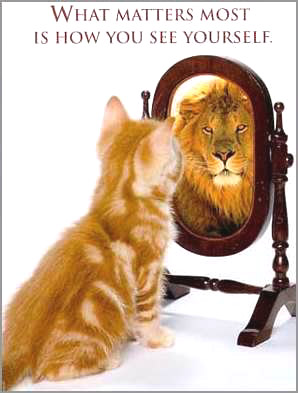I am going to talk to you about the
Atonement. At least the way I perceive the Atonement. This has sort of become my
pet concept in recent months, ever since a very special experience I had on January 9, 2013. I've already told a lot of people about what exactly happened on that day, but I'd like to talk for a while here about the kinds of things I've experienced immediately following that experience. I'm interested in the results of discovering the Atonement.
For years and years, I've had a
very particular attachment to a scripture found in the fifth chapter of Alma . I’m not sure exactly what began that
obsession. It might have been a Janice
Kapp Perry song. But for years, I
considered Alma
5:14 to be my all-time favorite scripture:
"And now behold, I ask of you, my brethren of
the church, have ye spiritually been born of God? Have ye received his image in your
countenances? Have ye experienced this
mighty change in your hearts?" (Alma 5:14)
I think what I initially liked
about that scripture was the fact that it’s a boatload of really important
questions. Actually, the whole fifth
chapter of Alma
is full of great questions. These are
the kinds of questions you should be asking yourself frequently.
Where am I on the road to salvation?
Have I been truly converted?
Is Christ’s image really reflecting through
my countenance?
Alma talks about experiencing a "mighty change of heart." Well what is that mighty change of
heart? It’s obviously a specific kind,
since he put the word this in front of it...
I have come to believe that what Alma is really asking here is this: Have I allowed the ATONEMENT to change my
heart?
I testify that the Atonement changes hearts.
And when it changes hearts, it changes lives.
One of my absolute favorite talks
ever given is by Elder Bednar. He spoke
at a University Devotional in 2001, and his address is called “In the Strength
of the Lord.” It is a GREAT talk for
college students and young people like us.
And I kid you not, it changed my life.
First he quotes President David O. McKay: "The purpose of the gospel is… to make bad men good and good men better, and to
change human nature.” Then Elder Bednar goes on to say, "Thus the journey
of a lifetime is to progress from bad to good to better and to experience the
mighty change of heart – and to have our fallen natures changed.” He then explains that in order to
experience such a change, we have to do as King Benjamin directs in Mosiah
3: We must put off the natural man and
become saints through the atonement of
Christ the Lord. (Mosiah 3:19)
That statement right there is
GOLD. We must put off the natural man
and become saints THROUGH THE ATONEMENT. We can't forget to include the Atonement, because only with the atonement does real, permanent change happen.
So that’s my first point. We can – and we must -- change through the
Atonement. The Atonement is an agent for
change. Or, as I would rather say, an agent for
TRANSFORMATION. Point one.
But now the question is HOW does
the Atonement change us? For a long time
I was really caught up in this question.
I had trouble visualizing exactly how something so abstract and so
eternal could actually have an effect on my life. I never questioned that it happened. I knew Christ existed. I knew Christ suffered and died, and I knew
that he rose from the grave and is now our Savior. But HOW did Christ save me? What was it that he did that makes his
sacrifice able to change who I am? How can something apply to me and yet still apply to someone else, with different problems and different sins and different experiences? And
more importantly, what do I have to do to make this Atonement thing work? It’s not a pill I could take. It’s not a hat I could put on. For a long time I imagined trying to hold the
Atonement in my hand, and all I could see myself doing was holding just
air. It was an elusive mystery that I could never understand. It’s more of an idea or event than
it is an actual thing. And I was really
frustrated by that, because I like things to be concrete. I like things to be measurable, but how do
you measure something that’s infinite? If
the Atonement is the result of an action by Christ, how can I really understand
what that action was if it happened two thousand years ago? If the
Atonement is a reconciliation with God, how can I know that I’m reconciled with
God without even seeing Him or witnessing His son's Atonement? Everything
is just so… unknown. Immeasurable.
Incomprehensible. HOW CAN I USE
THAT?
And up until just this past year, I had no answer to these questions. But then I experienced a
few trials that helped humble me and turn to the Lord, and suddenly one fine
day there were some things that clicked. I still don’t know the answer to this
question 100%, but I do know that the key is Christ.
One thing I now know for sure is in order to understand the Atonement enough to actually use it to
transform your heart, you need to understand Christ. And the way you understand Christ is to spend
time with him. Read the scriptures, you
guys. It’s such a smart idea. You can find out exactly how Christ behaved
and what his attitude was in the scriptures.
And the Book of Mormon… Oh Gosh, I learned so much from that
book this week.
So what have I learned about
Christ through reading the scriptures? Well, I've learned that he was both WILLING and ABLE to perform the Atonement.
He was ABLE in the fact that he was the only person on earth that could
do what he did. First of all, he’s the
only begotten of the Father. He had
Deity in his DNA, and therefore he was able to do something that only a God
could do. He was also ABLE to perform
the Atonement because he was perfect and without sin. No one else can say that about
themselves. No one else can atone for
us. Only Christ is ABLE to change us by
atoning for us.
But the more meaningful part about
this is the fact that he was not only ABLE, but WILLING. Christ, like everyone else on this earth, had
agency, and he CHOSE to perform the Atonement.
And I can’t speak for Christ, but from the looks of things, it was a
REALLY HARD CHOICE. Because of that choice, he had to experience an infinite amount of pain and suffering, only to be betrayed, scorned, and killed by people he loved immediately afterward. We read in Luke that
he said in Gethsemane , “Father, remove this
cup from me.” Obviously the conditions were less than desirable.
But then he says
“NEVERTHELESS (and I’ve recently learned a little about the power of that word,
NEVERTHELESS) not my will, but thine be done.” (Luke 22:44)
And what was God’s will? “God so loved the world, that he gave his
only Begotten son.” (John 3:16) “For behold, this is
my work and my glory, to bring to pass the immortality and eternal life of
man.” (Moses 1:39)
God LOVED us, so he sent his
Son. And Christ, he loved us enough to
perform the work God appointed him to do.
Christ was motivated to do what he did by love. He was not only ABLE to perform the infinite
Atonement, he was WILLING, because he loved us.
Now that kind of love is
confusing and overwhelming. Honestly, I've often wondered HOW someone could have that kind of love for me. What kind of love is it?
Last week, I went to the temple, and as I sat
there in my white jumpsuit waiting to do baptisms, I thought about the love of
Christ. It began with me stressing out about how other people (mainly boys) felt about me. I care so much about what this guy or that guy thinks of me... But I felt bad about it because I knew that I knew better than that. Christ loves me. Shouldn't that be all that matters? And that's when I started having this little battle
with myself. I thought, “Okay. Sure. Christ loves me. But that's nothing special. Christ loves everyone; what makes
his love for me so important?”
Have you
ever had your mom say “I love you” and you’re all like, “Oh mom, of course you
love me! You’re supposed to love
me! You’re my mom!” Well I sort of had that attitude towards
Christ. “Well, of course you love
me! You’re Jesus! You love everyone! How is that supposed to make me feel any
better? How does that make me
special?”
And then I heard this voice in my
head, very clear. It brought me to tears. It said, “Hannah, surely you
must know that my love for you is deeper than that! I love you perfectly! Because I KNOW YOU.”
And then my thoughts turned to my
dear sister Ellen, who is here in the congregation today. She’s going on a mission to the Philippines in
just three days, and I’m so excited for her. There in the temple, I thought of her and I realized that I don’t just love my sister
because she’s my sister and I HAVE to love her.
I love her because I know who she is. I've grown up with her. I have seen what a sweet, gifted, loving, beautiful daughter of God she
is, and I can’t help but love her! I love her because I know her!
CHRIST, OUR BROTHER, LOVES US BECAUSE HE HAS BEEN GIVEN THE POWER THROUGH THE
ATONEMENT TO SEE US FOR WHO WE REALLY ARE. HE KNOWS US PERFECTLY.
He has ULTIMATE, INFINITE empathy for us. It is impossible for any mortal to
understand EXACTLY what another person has gone through. We may have similar experiences and we can
experience similar feelings, but none of us can TRULY COMPLETELY empathize with
another person. Except CHRIST. Christ can perfectly empathize. And because of this infinite empathy brought about by the Atonement, Christ can have an infinite love for every person. He loves ME INFINITELY.
And the minute I figured that out, this "How-to-use-the-Atonement problem I had began to make sense. IF WE START
SEEING THINGS THE WAY CHRIST SEES THINGS, WE WILL EXPERIENCE THAT MIGHTY TRANSFORMATION OF OUR HEARTS! WE WILL EXPERIENCE A TRANSFORMATION
WITHIN OURSELVES. We will become like Christ. Like God! We will, as Moroni put it, be "made perfect in Christ." (Moroni 10:32)
And when I discovered this, I found the process begin to
happen within me!
I had the chance to take a look at
3 Nephi 17 this week. This is the
chapter where Christ says “Behold, my time is at hand,” (3 Nephi 17:1) and he prepares to
leave the Nephites after appearing unto them, but then he sees the multitude,
“in tears, and they did look steadfastly upon him as if they would ask him to
tarry a little longer with them.” (3 Nephi 17:5)
And what does Christ say? He says, “Behold, my bowels are filled with
compassion towards you. Have ye any that
are sick among you? Bring them
hither. Have ye any that are lame, or
blind, or halt, or maimed, or leprous, or that are withered, or that are deaf,
or that are afflicted in any manner?
Bring them hither and I will heal them.
My bowels are filled with mercy.” (3 Nephi 17: 6-7)
And then he commands that the
little children should be brought unto him.
And he kneels on the ground and groans within himself, and says,
“Father, I am troubled because of the wickedness of the people of the house of Israel .” (3 Nephi 17:14) And then he prays unto the Father, and the
“things which he prayed cannot be written…:And no tongue can speak, neither can
there be written by any man, neither can the hearts of men conceive so great
and marvelous things… and no one can conceive of the joy which filled [their] souls.” (3 Nephi 17:17)
I testify
that Christ’s bowels are filled with mercy towards every one of us. He sees us as we really are. He knows us perfectly. He has borne our griefs and carried our
sorrows. And when we disregard his
healing power, he is troubled. But I
also testify that if we start to see ourselves the way Christ sees us, and when
we start to follow his example and consider his Atoning hand in our lives, we
will be blessed.
I’ve always wondered why it was so
important for us to share the message of the Atonement to the world. If the Atonement is going to save us all
anyway, why do we need to know about it?
Why can’t we just be good people?
And there are so many good people who aren’t members of this faith. But then I considered the JOY that these
Nephites felt as they heard Christ pray.
“No one can conceive of the joy which filled their souls.” (3 Nephi 17:17) I believe -- nay, I know -- that the
Atonement not only ensures blessings for those who accept it in the future, but
it ensures blessings for us RIGHT NOW in this life! Having this heart transformation brings you joy! There are blessings that come from having a
knowledge of Christ’s atonement! The moment last January that I figured out
just how much Christ loved me, I found myself happier. Living the Gospel made me HAPPY. Obeying the commandments brought me JOY. I found myself more grateful for the things I
had. I discovered that I saw other
people differently – the way God would see them. I was beginning to have CHARITY.
It was like in those Claratin clear commercials. After a few seconds, the sheet is pulled back and the world suddenly becomes "Claratin-clear!" You don’t realize how dull and blurry the world was until you see things
through new eyes. Through the lens of God. When your heart is transformed, everything around you transforms as well. When you change the way you look at things, the things you look at change. The problems in
your life don’t go away, but you learn to see them differently.
Last January, I had a chance to experience a
change of heart. I became converted, and
for a short while, I could feel Christ’s image emanating in my own
countenance. There were some things I
thought I could never change about myself… and they were changing. I wasn’t always this bubbly, I promise. I've had my depression. I've had my trials. And I used to always think “Oh I can’t do that,
I’m not strong enough.” I can’t fast for
24 hours, I don’t have the constitution.
I can’t read my scriptures every day, I’m so busy. I can’t not be depressed, my life just sucks
so much. I can’t serve that person, I
don’t know him well enough. I can't forgive him, he's hurt me too much.
But suddenly… I can! Christ has not only healed me. He’s ENABLED me. Now I can do things I couldn't do before.
But suddenly… I can! Christ has not only healed me. He’s ENABLED me. Now I can do things I couldn't do before.
How can I not share such an
amazing, transforming message!?
The Atonement is for everyone. It is not rocket science. If it were rocket science, then Christ would
only be inviting the rocket scientists to come unto him. He’s not.
He invites all men to come and partake of his goodness, and he denieth
no one who cometh unto him. (2 Nephi 26:33)
The Atonement is a transforming
agent. It not only possesses a healing
power, but also an ENABLING power. It changes bad people into good people,
yes. But it also changes good people
into better people. It is through the
Atonement that a simple “I’m sorry” turns into repentance. It’s through the Atonement that a simple
promise is turned into a covenant. It’s
through the Atonement that a marriage is turned into a sealing. Through the
Atonement of Christ, miracles are performed, and things that are dead are given
life. Yes, Christ turned water into
wine, but he also can turn a trial into a blessing. A meaningless thing into a meaningful thing.
An ordinary person into an extraordinary person. It’s through the Atonement
that “I can’t” turns into “I CAN!”







